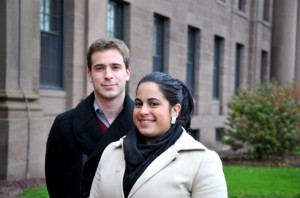Grant-Funded Program Offers Courses to Inmates

Nineteen students are enrolled in a new grant-funded pilot program that provides classes taught by faculty volunteers and is administered by two graduate students. What makes this program different from any other outreach initiative by Wesleyan is that the students are incarcerated.
“The mission of Wesleyan’s Center for Prison Education” program is to practice Wesleyan’s civic engagement by offering college courses to incarcerated individuals, in order both to enrich the lives of those who are systematically denied access to educational opportunities and to enhance Wesleyan’s academic community,” explains program manager Cathy Crimmins Lechowicz, director of community service and volunteerism.
The program is administered through Wesleyan’s Center for Community Partnerships.
More than 120 inmates applied for the 19 available spots in the program, submitting essays and other materials. Over the next two years, the enrolled students will pursue a broad curricular sequence of undergraduate courses in the humanities, natural and social sciences.
“Courses offered are the same courses taught on Wesleyan’s campus and uphold the same high standards of academic rigor as those taught on campus,” says Prison Education fellow Molly Birnbaum ’09.

Classes are taught by Wesleyan faculty or guest instructors. This fall, ENGL 130 is taught by guest lecturer Beth Richards, and SOC 152 is taught by Charles Lemert, the Andrus Professor of Sociology. Next spring, Mike McAlear, associate professor of molecular biology and biochemistry, will teach CHEM 119, “Biology and Chemistry and the Modern World: A Survey of Drugs and Disease.”
The inmates will complete two courses per semester, enrolling in a total of eight courses over a two-year pilot program. Classes meet for three hours each week. In addition to faculty teaching, incarcerated students have access to academic support from teaching-assistants and student writing tutors.
The prison education initiative was spearheaded by Birnbaum and Russell Perkins ’09, who are now center fellows. Alexis Sturdy ’10 is the student coordinator.
As undergraduates, Birnbaum and Perkins facilitated educational workshops in creative writing, philosophy, sociology at Cheshire Correctional Institution and maximum-security York Correctional Institution in Niantic, Conn. Along with other students involved in Wesleyan’s Prisoner Solidarity Project and the Wesleyan Prisoner Resource Education Project (WesPREP), Birnbaum and Perkins proposed the idea of a college-in-prison program last fall.
The basis for their proposal were data indicating that college-in-prison programs reduced re-incarceration rates from 60 percent to under 15 percent. Nevertheless, in Connecticut – the state with the highest level of imprisonment in the Northeast– no such program existed.
Last year, the seniors worked with Crimmins Lechowicz and Sonia Mañjon, vice president for diversity and strategic partnerships on a proposal, which was later approved by the faculty, and then President Michael Roth and the Cabinet. The program is a member of the Consortium for the Liberal Arts in Prison at Bard College and is privately funded through the Bard Prison Initiative.
The program also provides diverse research and volunteer opportunities for Wesleyan students. Current undergraduates have the opportunity to collaborate through new course offerings, workshops, a service-learning course, a collaborative tutorial and tutoring.
In a Nov. 16 New York Times article, the two-month-old Wesleyan program is considered “one of a few in the country where the selection process is highly rigorous, where academic potential is the primary criterion and where past criminal conduct, however heinous, is not considered in admission.”

